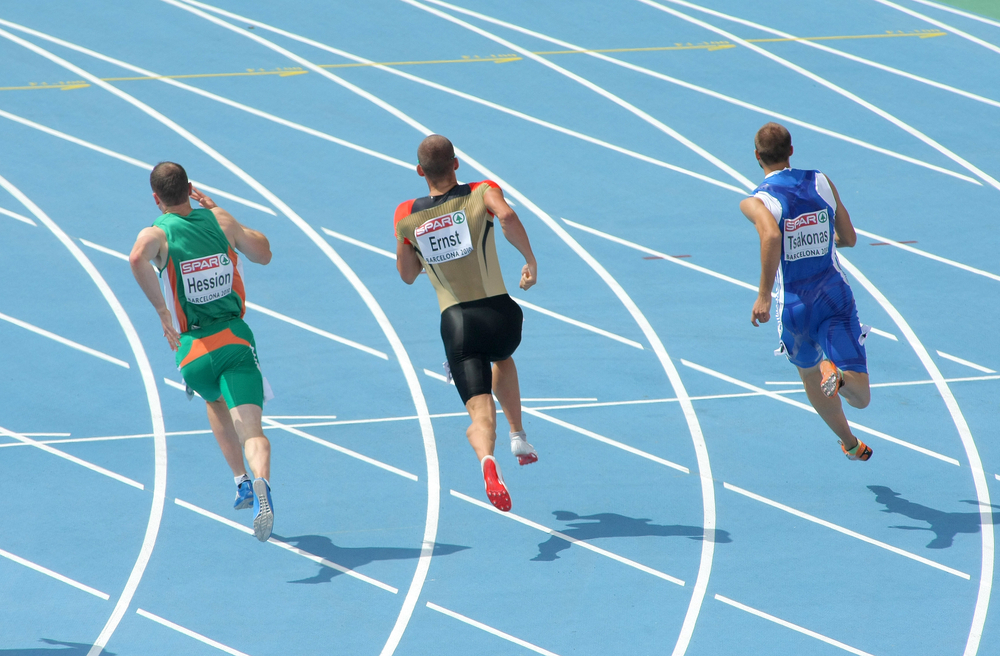The athletics portion of the Olympics has finally arrived in Tokyo 2020 and it’s interesting how much it resembles its ancient predecessor, when competitors from Greece’s coexisting city states would meet naked in Olympia every four years to run, wrestle, throw and box their way to glory under the piercing Hellenic sun.
Discuses and javelin are still hurled into the ether, sprinting remains the marquee event and the athletes have yet to become fully comfortable with the idea of clothing.
Elsewhere in the Olympics things have changed quite a bit. Chiefly, equestrian events have become less exciting over the past couple millennia. Where once we had hurtling chariots enlivening a bloodthirsty audience, now we have dancing horses and Victorian costumes.
Male to female trans weightlifter Laurel Hubbard, 43, is out of the Tokyo Olympics after failing on her third lift attempt. https://t.co/XOEo606jcU
— Andy Ngo (@MrAndyNgo) August 2, 2021
Rules Are Rules
Here’s another interesting quirk of the ancient Games: athletes who made false starts faced corporal punishment. Isn’t it good we’ve altered that stipulation, considering how many sprinters got the jitters on the starting blocks this weekend past, including the eventual gold-medal winner Lamont Marcell Jacobs from Italy.
In the women’s final, the Jamaicans had a clean sweep of the podium. It’s crazy how a small Caribbean nation has monopolized sprinting in the modern era. Perhaps there is something in the ganja. I jest, of course – just ask US sprinter Sha’Carri Richardson.
The athletics world was in mourning when she was axed from the competition after testing positive for cannabis in early July. Athletes can’t smoke a joint but a bottle of whisky with a side of opioids is fair game. Nevertheless, it’s the rules that need revising, not the decision to uphold them.
On the subject of rules, Laurel Hubbard, the first openly trans weightlifter to compete in the Games, came in last in the women’s 89+kg final. Perhaps not incidentally, on the eve of the event, the IOC acknowledged its testosterone-based guidelines for transgender athletes were no longer fit for purpose. Here’s a thought then: wouldn’t it have been a swell idea to revise them a little earlier?
The woes of Namibian sprinters Christine Mboma and Beatrice Masilingi, both biological females from birth, show how unevenly hormone logic is applied in professional competition. Both were banned from the women’s 400m event at Tokyo 2020 because their testosterone levels were above the 5nmol/L limit set by World Athletics. For purposes of comparison, Hubbard was required to show testosterone levels under 10nmol/L.
I asked 🇺🇸 Ryan Murphy, who just took silver in the 200 back behind Russia’s Evgeny Rylov, about any concerns he had about his opponents doping.
“I’m swimming in a race that’s probably not clean,” he said. Full quote below ⬇️ pic.twitter.com/Z264TV9vyq
— Laine Higgins (@lainehiggins17) July 30, 2021
The Olympic Spirit
The shadow of doping also looms large over the Games. The fact that Russia are not Russia (but are also definitely Russia) has been a constant, red-white-and-blue reminder of the inextricable link between elite sport and performance-enhancing drugs.
American swimmer Ryan Murphy tossed fuel on the doping fire when he sent a scattershot of allegations around the press room at the Tokyo Aquatics Center. His indirect answers were everything but an attack on the man who bested him in the 200m backstroke final – a Russian, no less – Evgeny Rylov.
Though if Murphy wanted to lend credence to his claim, he shouldn’t have waited until he lost before suggesting the race was “probably not clean.”
Pop Goes the Bubble
A fellow called Dong Dong – first name Dong, surname Dong – won silver in the men’s trampolining. Two more athletes with fantastic names, Vazha Margvelashvili and Lasha Shavdatuashvili of Georgia, made the wrong kind of headlines this week when they exposed the porous nature of the Games’ Covid-19 bubble by popping out for an afternoon’s sightseeing.
It was hardly a calculated act of espionage. Both men had just competed on live television in Japan’s most historic Olympic event against Japanese competitors. And – you couldn’t make this one up – both were disguised in their Team Georgia tracksuits posing for pictures outside Tokyo Tower.
At least their silver medals served as a reminder that Japan has been walloping everyone in the judo. The only surprise with Japan’s record-breaking ninth gold at the Nippon Budokan (surpassing its own Olympic record from Athens 2004), was that it didn’t become 10 in the mixed teams final.
Exclusive: Belarusian athlete Krystsina Tsimanouskaya said she was taken to the airport against her wishes to board a flight back home after she publicly complained about national coaches at the Tokyo #Olympics. @gabrielletf reports https://t.co/jICTnn3L4p pic.twitter.com/656Yc9nS93
— Reuters (@Reuters) August 1, 2021
The Run of Her Life
Belarussian athlete Krystsina Tsimanouskaya has also left the bubble, but under rather more distressing circumstances. National Olympic Committee coaches faithful to the Alexander Lukashenko dictatorial regime allegedly coerced the 24-year-old sprinter to board a flight to Minsk after she had criticized Belarusian sports officials.
Tsimanouskaya’s plea for help on social media alerted the Japanese authorities. The Polish embassy then swooped in with an offer of a humanitarian visa, while her husband had fled across the Belarusian border into the protective arms of Ukraine.
Even when the five Olympic committees aren’t orchestrating their own blunders, Tokyo 2020 is proving to be more drama-filled than a Bollywood blockbuster.
One of my favorite Twitter threads on the story involved a person who compared Tsimanouskaya’s kidnapping to Irish footballer Roy Keane being sent home prior to the 2002 football World Cup. Tsimanouskaya was looking at the gallows, while Keane was perhaps barred from his local pub until further notice.
In any event, the drama will doubtless continue in the closing week of Tokyo 2020. And can you believe we’re coming down the final stretch already?
Feature image: Maxisport / Shutterstock.com









